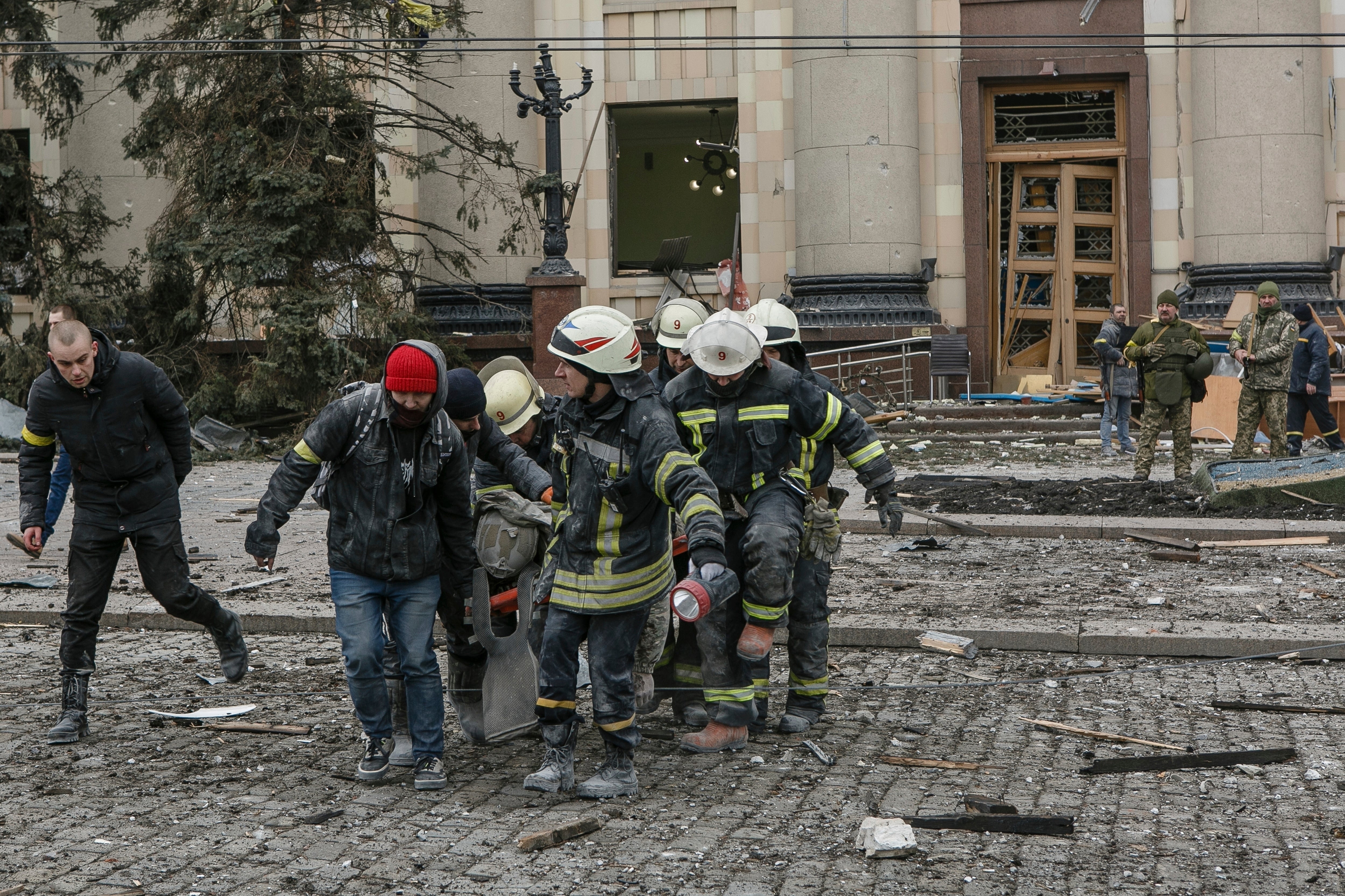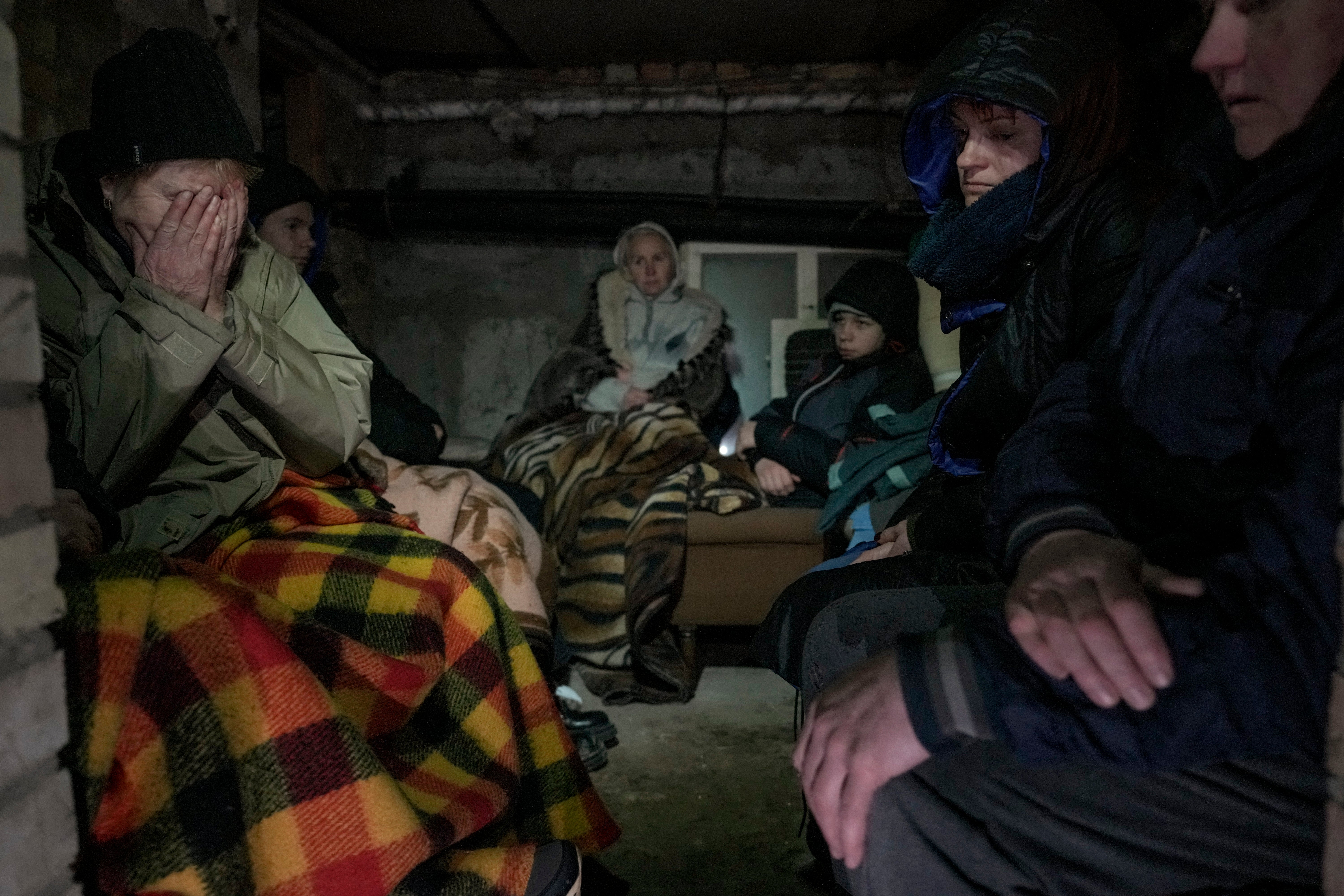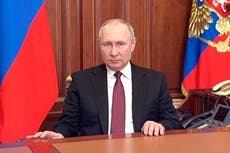‘Cover the town with artillery fire’: Online sleuths are intercepting Russian radio communications and revealing potential war crimes
‘Remove the first military property from the town, then cover the town with artillery fire,’ says a Russian soldier in one recording

Intercepted radio communications between Russian military units in Ukraine have revealed potential war crimes and scenes of disarray within the ranks of the invading army.
Open source intelligence experts and online volunteers have intercepted and released excerpts of what they claim to be battlefield radio communications between Russian forces currently inside Ukraine.
While the vast majority of communication is likely being conducted via secure channels, many Russian soldiers have been using analogue radios to communicate on the battlefield, the experts said. That has allowed a community of online sleuths to monitor those communications and share them publicly. They are calling their mission ‘Operation Russian Radio.’
In one conversation translated by The Independent, which is filled with military language and call signs, a commander appears to order artillery fire on a populated area.
“Remove the first military property from the town, then cover the town with artillery fire,” says one of the Russian soldiers, who appeared to belong to an artillery unit, in one recording.
Indiscriminate attacks that result in death or injury to civilians amount to war crimes under international law.
The veracity of the recordings could not be independently verified by The Independent, but the content matches open source and video evidence showing the bombing of civilian areas by the Russian military.
There has been a marked increase in Russian artillery and missile strikes on populated urban areas over the past two days. Videos showed Ukraine’s second city of Kharkiv being hit with intense bombardment on Wednesday, with the city’s central square hit by a missile strike and at least 21 people reported killed. Ukrainian authorities said five people were killed in the attack on a TV tower in the capital Kyiv.
Ukraine’s State Emergency Service said Wednesday that more than 2,000 civilians have been killed since Russia invaded on 24 February. That number is impossible to verify given the scale of the violence across the country.
ShadowBreak International, a private British intelligence-gathering company that has posted some of the recordings online, said it has been “closely cooperating with radio amateurs & translators, across the globe, to document and gather intelligence.”
Together with the volunteers they are using publicly available tools to intercept and translate these communications in real-time, and share the recordings with the world.
“An entire community created itself around those communications, currently scanning and recording anything of interest, including ShadowBreak. Creating hours of intense Russian army chatter recordings, each demonstrating an army unprepared for such a situation,” ShadowBreak said.
Eighteen-year-old Kirill Timchenko, a Ukrainian currently outside of his home country, said he joined this volunteer effort because he wanted to help in some way, and has spent the last four days listening to Russian units communicating with each other.
“I did about 300 translations where there was a lot of information. I’ve been doing this for four days without much rest,” he told The Independent. He added that they had heard the soldiers directing artillery, mortars and missiles “blindly.”
“I decided to help because Ukraine is my homeland. Unfortunately, I am not there at the moment. So listening and transmitting information for me is like fighting for my homeland in cyberspace,” he said.
Mr Timchenko said he had heard many Russian soldiers complaining that “they are suffering, their evacuation service is taking a long time to pick up the wounded, and they are also shelling populated areas with artillery.”

The same artillery unit that was heard appearing to order an artillery strike on a populated area has had its communications monitored, translated and posted online in real-time for days. Other conversations found that the same unit was having difficulty reaching its superiors, and was exchanging phone numbers with other units in order to communicate.
The ease with which online volunteers have been able to listen into and share Russian communications raises questions about the logistical competence of the invading force. Britain’s ministry of defence said this week that the Russian army has not made the progress it planned because of “logistical challenges and strong Ukrainian resistance.”
Some of those challenges were evident in the intercepted communications.
In one recording, a man who appears to be a commander shouts at his subordinates for failing to activate a piece of equipment, which may be a portable anti-aircraft device.
“[indistinguishable] is not ready yet. There is not enough voltage,” says one Russian speaker.
“Oh go f*** yourselves you f***ing sheep! You are standing there for three f***ing days, copy.”
“Yes,” comes a reply.
“What’s motherf****ing yes? When is it going to be f***** ready, this is a s***show.”
In another, a Russian soldier can be heard ordering a unit to send their killed and injured troops to a certain point, to which someone replies with possible numbers of casualties: 22 from one unit, and five from another.
ShadowBreak International has only released a fraction of the recordings so far, but the group said it had more than hours of communications and that “every conversation displayed a disturbing lack of coordination between units, sometimes even firing at each other.”
The company said that the simple fact that Russian troops were using analogue radios instead of secure digital channels showed a lack of logistical preparedness for the invasion.
This communication method has also been vulnerable to frequency jamming and interference, which has at times hampered the ability of Russian soldiers to communicate. On a number of occasions, their communications were interrupted by someone drowning out their conversation by playing the Ukrainian national anthem on the same frequency.
Join our commenting forum
Join thought-provoking conversations, follow other Independent readers and see their replies
Comments


Bookmark popover
Removed from bookmarks